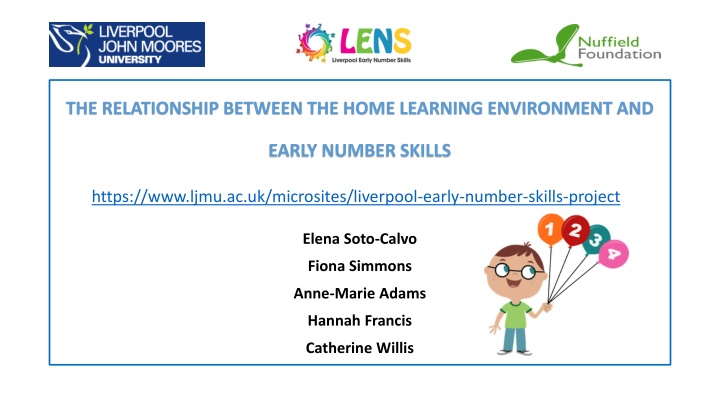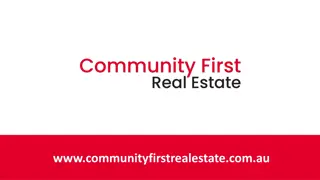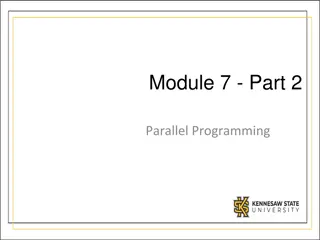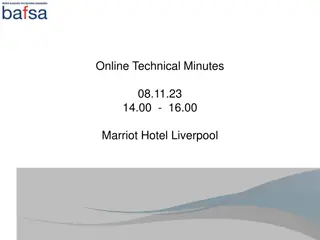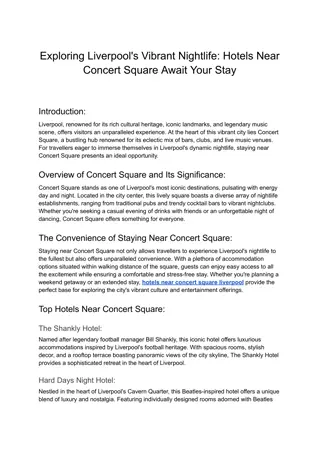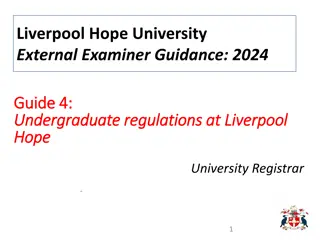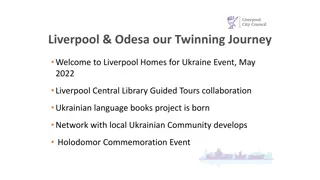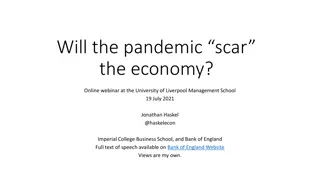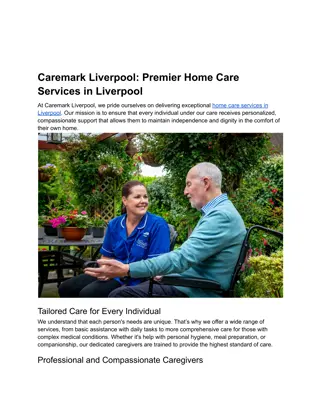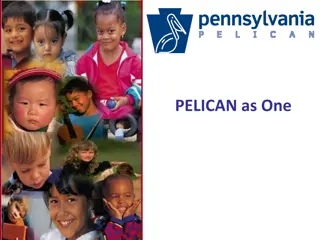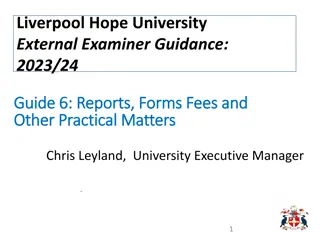Early Number Skills Project Overview at Liverpool John Moores University
This project at Liverpool John Moores University aims to explore the relationship between the home learning environment and early number skills in preschoolers. It covers key questions, project overview, sample details, and more.
Download Presentation

Please find below an Image/Link to download the presentation.
The content on the website is provided AS IS for your information and personal use only. It may not be sold, licensed, or shared on other websites without obtaining consent from the author.If you encounter any issues during the download, it is possible that the publisher has removed the file from their server.
You are allowed to download the files provided on this website for personal or commercial use, subject to the condition that they are used lawfully. All files are the property of their respective owners.
The content on the website is provided AS IS for your information and personal use only. It may not be sold, licensed, or shared on other websites without obtaining consent from the author.
E N D
Presentation Transcript
Liverpool John Moores University THE RELATIONSHIP BETWEEN THE HOME LEARNING ENVIRONMENT AND EARLY NUMBER SKILLS https://www.ljmu.ac.uk/microsites/liverpool-early-number-skills-project Elena Soto-Calvo Fiona Simmons Anne-Marie Adams Hannah Francis Catherine Willis
Liverpool Early Number Skills: Key questions Liverpool Early Number Skills: Key questions Overall 1. To what extent do preschool language and cognitive skills predict growth in early number skills? 2. To what extent do number-oriented and language and literacy-oriented aspects of the home learning environment predict growth in early number skills? 3. To what extent are the relationships between the quality of the home learning environment and early number skills direct and to what extent are they indirect via the promotion of language skills? Today Reliability of the questionnaire Scales Score distribution of the Early Number Skills tasks Relationships between questionnaire scales and Early Number Skills tasks
Liverpool Early Number Skills: Project Overview Liverpool Early Number Skills: Project Overview What? SES (postcode and qualifications) T When? Measure/Task How? Preschool hours Home Learning Environment Reception expectations Attitudes to mathematics & Mathematical anxiety Sequential & Cardinal counting Numeral translation Calculation Home Questionnaire Environment Winter & Spring term T1 Preschool 2017 Early Number Skills 2 Sessions Preschool Environment Language & Reasoning Skills Early Childhood Environment Rating Scale (ECERS-3) 3-hour T2 Summer term Expressive and Receptive vocabulary, Phonological awareness, Central executive functioning 3 Sessions Sequential & Cardinal counting Numeral translation Calculation Reception 2018 Early Number Skills 2 Sessions T3 Summer term Mathematics & Reading Skills Standardised mathematics & Word Reading tests 1 Session
Liverpool Early Number Skills: SAMPLE Liverpool Early Number Skills: SAMPLE 40 Early Years Settings Born between 1/9/2012 and 31/8/2013 274 302 Participants in final sample Questionnaires received T1 assessments completed PARENTS (Respondents) Children (Participants) Gender: 254 Females Gender: 146 Females Mean Postcode deprivation decile (from English indices of deprivation 2015): M = 5.42 (SD = 3.32) Mean age (at end of T1): 48 Months (SD = 3.63) Mean number of preschool sessions a week: 5.33 (SD = 1.53) General Qualification (from Regulated Qualification Framework 0-8): M = 4.80 (SD = 2.04) Ethnicity: 91% white Additional language at home: 23 SEN: 8 (plus 7 referred)
Questionnaire (1/5): Home Experiences Questionnaire (1/5): Home Experiences Rate how often your child experiences the different types of activities at home (Skwarchuk et al., 2014) NUMBER (8) LETTERS AND SOUNDS (7) LANGUAGE & LITERACY (8) Looks at factual books Is taught the names of numbers Sings or recites the alphabet Is prompted to identify letters in books or the environment Discusses stories with an adult Recites numbers in order Never (0) - Several times a day (5) Plays games that involve number cards, dice or a number spinner Is taught the names or sounds of letters Has stories read to them 6-point Likert Scale; Is encouraged to use books to follow-up interests Is encouraged to point out or identify numbers in books Plays with puzzles or games involving letters Is encouraged to point out or identify pictures in books Completes number activities in magazines or workbooks Forms or traces letters or writes their name Discusses with an adult how things work or what they mean Discusses numbers or quantity with an adult Talks about letter sounds with an adult Makes up songs, stories or rhymes Writes or traces number Completes activities involving letters or sounds in magazines or workbooks Is encouraged to choose books that interest them to look at with an adult Sings number songs 3.50 .74 = .77 M SD 3.08 .82 = .81 2.92 .97 = .81
= . = = .44 44 Questionnaire (2/5): Home Resources Questionnaire (2/5): Home Resources State the number of the following toys, games and resources that you have in your home NUMBER (4) LETTERS AND SOUNDS (4-1) LANGUAGE & LITERACY (Book Exposure) Puzzles or jigsaws involving numbers Puzzles or jigsaws involving letters Book Exposure Measure (as in Skwarchuk et al., 2014) Magazines, books or workbooks involving numbers Magazines, books or workbooks involving letters *15 Actual story book titles *6 Foil book titles Games involving numbers, a number spinner or dice Sets of wooden, plastic, card or magnetic letters [(Story books titles correctly identified - Foils identified as real books) / total number of actual books]x 100 Sets of wooden, plastic, card or magnetic numbers Games involving letters M = 3.86 M = 2.06 M = 53.51 SD = 3.27 SD = 1.70 SD = 21.60 = .58 = .74 = .77 (for Real Books)
Questionnaire (3/5): Reception Expectations Questionnaire (3/5): Reception Expectations Rate how important you think it is for children to have achieved the following before they start Reception (Early Years Outcome 2013, DfE) PERSONAL, SOCIAL & EMOTIONAL DEVELOPMENT (4) 30-50 help when they need it NUMBER (4) LITERACY (4) Be confident in asking an adult for Listen to and enjoy a story in a small group Very unimportant (1) - Very important (5) Recite the numbers 1 to 10 in order Recognise and respect rules Recognise some numerals Write own name 5-point Likert Scale; 40-60 months Have some strategies for resolving conflicts with other children without aggression Count up to four objects accurately Link sounds to letters e. g. Know what sounds letters can make Be confident in talking to other children including listening and responding to what others say Uses more and fewer to compare two sets of objects Hear and say the sounds words begin with e. g. dog begins with d Above M SD Talk confidently in front of a group of others Complete simple written calculations Independently read and understand simple books 4.54 .54 .84 4.28 .72 .91 4.08 .69 .81
Questionnaire (4/5): Maths Attitudes Questionnaire (4/5): Maths Attitudes Tick the box that relates most closely to how you feel about the statement (Tapia, 1996). Positively Phrased items Negatively Phrased items (Reversed scoring) Mathematics is a very worthwhile and necessary subject Mathematics is dull and boring I get a great deal of satisfaction out of solving a mathematics problem Strongly Disagree (1) - Strongly Agree (5) Mathematics helps develop the mind and teaches a person to think Mathematics makes me feel uncomfortable Mathematics is important in everyday life Mathematics is one of the most important subjects for people to study 5-point Likert Scale; When I hear the word mathematics, I have a feeling of dislike Mathematics does not scare me at all I have a lot of self-confidence when it comes to mathematics It makes me nervous to even think about having to do a mathematics problem I am able to solve mathematics problems without too much difficulty I learn mathematics easily I feel a sense of insecurity when attempting mathematics I am confident that I could learn advanced mathematics I really like mathematics Mathematics is a very interesting subject My mind goes blank and I am unable to think clearly when working with mathematic The challenge of mathematics appeals to me I believe I am good at solving mathematics problems M = 3.68; SD = .71; = .95
Questionnaire (5/5): Math Anxiety Questionnaire (5/5): Math Anxiety Indicate how anxious these activities would make you feel (Rounds & Hendel, 1980). Items Determining the amount of change you should get back from a purchase involving several items Reading your payslip (or other statement showing your earnings and taxes) Being given a set of numerical problems involving addition to solve on paper Not at all anxious (1) - Very anxious (5) 5-point Likert Scale; Dividing a five digit number by a two digit number with pencil and paper Reading a cash register receipt after your purchase Figuring out your monthly budget Listening to a person explain how he figured out your share of the cost of a meal including food, drinks and a 15% tip Hearing people quote the odds as they make bets at a sporting event Figuring out which of two job offers is the most lucrative Working a concrete, everyday application of mathematics that has meaning to you Being given a set of numerical problems involving addition to solve on paper Adding up 976 + 777 on paper M 1.46 SD .54 .88
Early Number Skills ( Early Number Skills (n n =274) =274) What does the mean mean ? Max Possible Measure Task M SD Max. Sequential Counting Highest number 16.57 14.23 110 Give me X 3.17 5 objects 2.47 11 15 Cardinal Counting Counting Objects 5.14 8 objects 2.72 14 20 Number Recognition 6.41 Start of double-digit numbers 5.32 20 20 Number Translation Numeral Reading 5.07 End of single-digit numbers 3.99 20 20 Adds 1 or 2 to a number below 5 Additions 1.69 2.24 12 12 Calculation (Story Problems with concrete support) Takes away 1 or 2 from a number below 5 Subtractions 2.23 2.23 10 12
Home Experiences Home Experiences Subscales Partial correlations controlling for Age in months (1/4) Subscales Partial correlations controlling for Age in months (1/4) with Early Number Skills (n = 274, df = 255) Sequential Counting Cardinal Counting Number Translation Calculation Highest number Counting Objects Number Recognition Numeral Reading Give me X Additions Subtractions Home Experiences Number .140* .194** .194** .226*** .194** .118 .144* Letters & Sounds .168** .259*** .222*** .246*** .202** .196** .200** Language & Literacy .039 .098 .070 -.008 -.072 -.010 .083 * p < .05 ** p < .01 *** p < .001
Home Resources Home Resources Subscales Partial correlations controlling for Age in months (2/4) Subscales Partial correlations controlling for Age in months (2/4) with Early Number Skills (n = 274, df = 258) Sequential Counting Cardinal Counting Number Translation Calculation Highest number Counting Objects Number Recognition Numeral Reading Give me X Additions Subtractions Letters & Sounds Resources .113 .194** .049 .115 .079 .090 .155* Home Book Exposure .130* .077 .117 .076 .095 .034 .066 * p < .05 ** p < .01
Reception Expectations Reception Expectations Subscales Partial correlations controlling for Age in months (3/4) Subscales Partial correlations controlling for Age in months (3/4) with Early Number Skills (n = 274, df = 260) Sequential Counting Cardinal Counting Number Translation Calculation Highest number Counting Objects Number Recognition Numeral Reading Give me X Additions Subtractions Personal, Social & Emotional Development Reception Expectations .022 -.038 .004 -.082 -.086 -.053 .001 Number -.009 .066 -.013 .072 .005 .049 .011 Literacy .040 .114 .056 .095 .056 .099 .122* * p < .05
Maths Attitudes Maths Attitudes & & Maths Anxiety Scales Maths Anxiety Scales Partial correlations controlling for Age in months (4/4) Partial correlations controlling for Age in months (4/4) with Early Number Skills (n = 274, df = 248) Sequential Counting Cardinal Counting Number Translation Calculation Highest number Counting Objects Number Recognition Numeral Reading Give me X Additions Subtractions Maths Attitudes .040 .055 .034 .063 .103 .029 .079 Maths Anxiety -.125* -.103 -.068 -.085 -.124 -.112 -.155* * p < .05 ** p < .01 *** p < .001
Liverpool Early Number Skills: Summary of preliminary findings Liverpool Early Number Skills: Summary of preliminary findings All Questionnaire Scales and Subscales (with exception of Home Number Resources) have either acceptable, good or excellent internal reliability The Counting and Number Translation skills have a good spread of scores with no floor or ceiling effects The Number scale and the Letters and Sounds scale of the Home Experiences are significantly and positively associated with the Early Number skills (but not Language and Literacy Home Experiences) The Early Number Skills relate differently to different Home Resources: Give me X and subtractions are associated with Letters and Sounds Home Resources Sequential counting is associated with Language and Literacy Resources and Book Exposure Home Resources Reception Expectations Literacy (.122*) and Maths Anxiety (-.155*) are only significantly associated with subtractions
Liverpool Early Number Skills: Discussion and future steps Liverpool Early Number Skills: Discussion and future steps Overall, home experiences (what parents report doing) have more consistent relationships with children s early number skills than home resources (what parents report having) or their attitudes and anxiety towards mathematics. Experiences that focus on the semantics of language (i. e. Home Experiences Language and Literacy, Home Resources Book exposure) have less consistent relationships with Early Number Skills than experiences that focus on the sub-lexical code of language (Home Experiences Letters and Sounds) or the numerical code (Home Experiences Number). Having a parent who incorporates activities and discussion focussing on the symbolic systems for number and for letters and sounds is associated with the development of early number skills Our future analyses will focus on the extent that these early experiences inter-relate with language and cognition & the extent that they predict growth in Early Number Skills
Liverpool Early Number Skills: Time for Questions & Hopefully Answers Liverpool Early Number Skills: Time for Questions & Hopefully Answers Thank you for your attention!! Elena Soto-Calvo, PhD Liverpool Early Number Skills Project (LENS) Natural Sciences and Psychology Tom Reilly Building, Byrom Street, Liverpool, L3 3AF We would also like thank the children and settings for their participation and support t: 01519046338 e: E.SotoCalvo@ljmu.ac.uk e: LENS@ljmu.ac.uk
